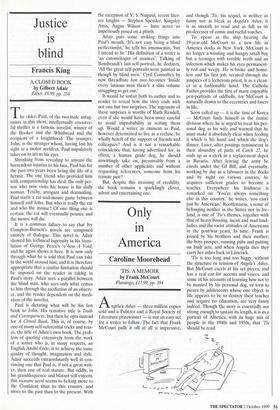Only in
America
Caroline Moorehead
'TIS: A MEMOIR by Frank McCourt Flamingo, £1Z99, pp. 384
Angela's Ashes — three million copies sold and a Pulitzer and a Royal Society of Literature prizewinner — is not an easy act for a writer to follow. The fact that Frank McCourt pulls it off at all is impressive, and though 'Tis, his sequel, is neither as funny nor as bleak as Angela's Ashes, it is as smooth to read and as full as its predecessor of comic and rueful touches.
'Tis opens as the ship bearing the 19-year-old McCourt to a new life in America docks in New York. McCourt is no longer a winning and hungry small boy but a teenager with terrible teeth and an infection which makes his eyes permanent- ly red and weepy. He is broke and home- less and his first job, secured through the auspices of a lecherous priest, is as a clean- er in a fashionable hotel. The Catholic Father provides the first of many enjoyable pen-portraits of oddballs, for McCourt is naturally drawn to the eccentrics and losers in life.
Soon called up — it is the time of Korea — McCourt finds himself in the canine division where he is urged to treat his per- sonal dog as his wife and warned that he must make it absolutely clear when feeding it which is his hand and which the dog's dinner. Later, after postings reminiscent in their absurdity of parts of Catch 22, he ends up as a clerk in a replacement depot in Bavaria, After leaving the army he enrols under the GI Bill, and eventually, working by day as a labourer in the docks and by night on various courses, he acquires sufficient grades to become a teacher. Everywhere his Irishness is remarked on: 'You're always something else in this country,' he writes, 'you can't just be American.' Rootlessness, a sense of belonging neither in the States nor in Ire- land, is one of 'Tie's themes, together with that of heavy boozing, mean and mad land- ladies and the racist attitudes of Americans in the post-war years. In time, Frank is joined by his brothers and their mother; the boys prosper, running pubs and putting on Irish acts, and when Angela dies they carry her ashes back to Limerick.
'Tis is too long and too baggy, without the structure or tension of Angela's Ashes. But McCourt excels at his set pieces, and has a real ear for accents and voices, and some of his accounts of learning how not to be mauled by his personal dog, or torn to pieces by adolescents whose one object in life appears to be to destroy their teacher and acquire no education, are very funny indeed. Though the story is essentially not strong enough, to sustain its length, it is as a portrait of AMerica, with its huge mix of people in the 1940s and 1950s, that 'Tis should be read.










































































 Previous page
Previous page